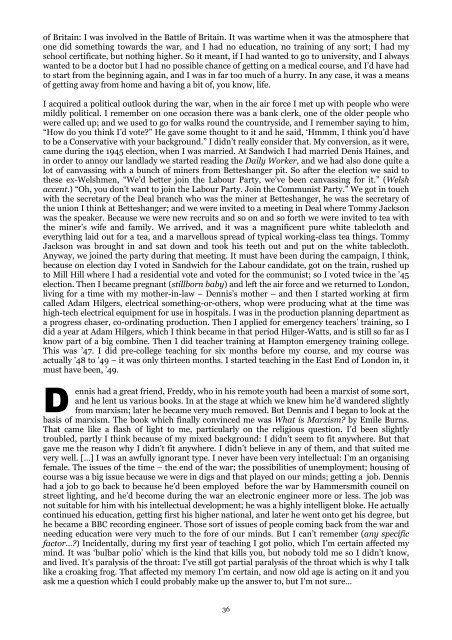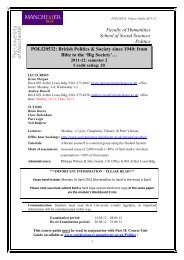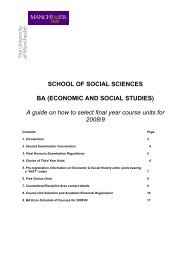CHNN 22, Spring 2008 - School of Social Sciences
CHNN 22, Spring 2008 - School of Social Sciences
CHNN 22, Spring 2008 - School of Social Sciences
Create successful ePaper yourself
Turn your PDF publications into a flip-book with our unique Google optimized e-Paper software.
<strong>of</strong> Britain: I was involved in the Battle <strong>of</strong> Britain. It was wartime when it was the atmosphere that<br />
one did something towards the war, and I had no education, no training <strong>of</strong> any sort; I had my<br />
school certificate, but nothing higher. So it meant, if I had wanted to go to university, and I always<br />
wanted to be a doctor but I had no possible chance <strong>of</strong> getting on a medical course, and I’d have had<br />
to start from the beginning again, and I was in far too much <strong>of</strong> a hurry. In any case, it was a means<br />
<strong>of</strong> getting away from home and having a bit <strong>of</strong>, you know, life.<br />
I acquired a political outlook during the war, when in the air force I met up with people who were<br />
mildly political. I remember on one occasion there was a bank clerk, one <strong>of</strong> the older people who<br />
were called up; and we used to go for walks round the countryside, and I remember saying to him,<br />
“How do you think I’d vote?” He gave some thought to it and he said, ‘Hmmm, I think you’d have<br />
to be a Conservative with your background.” I didn’t really consider that. My conversion, as it were,<br />
came during the 1945 election, when I was married. At Sandwich I had married Denis Haines, and<br />
in order to annoy our landlady we started reading the Daily Worker, and we had also done quite a<br />
lot <strong>of</strong> canvassing with a bunch <strong>of</strong> miners from Betteshanger pit. So after the election we said to<br />
these ex-Welshmen, “We’d better join the Labour Party, we’ve been canvassing for it.” (Welsh<br />
accent.) “Oh, you don’t want to join the Labour Party. Join the Communist Party.” We got in touch<br />
with the secretary <strong>of</strong> the Deal branch who was the miner at Betteshanger, he was the secretary <strong>of</strong><br />
the union I think at Betteshanger; and we were invited to a meeting in Deal where Tommy Jackson<br />
was the speaker. Because we were new recruits and so on and so forth we were invited to tea with<br />
the miner’s wife and family. We arrived, and it was a magnificent pure white tablecloth and<br />
everything laid out for a tea, and a marvellous spread <strong>of</strong> typical working-class tea things. Tommy<br />
Jackson was brought in and sat down and took his teeth out and put on the white tablecloth.<br />
Anyway, we joined the party during that meeting. It must have been during the campaign, I think,<br />
because on election day I voted in Sandwich for the Labour candidate, got on the train, rushed up<br />
to Mill Hill where I had a residential vote and voted for the communist; so I voted twice in the ’45<br />
election. Then I became pregnant (stillborn baby) and left the air force and we returned to London,<br />
living for a time with my mother-in-law – Dennis’s mother – and then I started working at firm<br />
called Adam Hilgers, electrical something-or-others, whop were producing what at the time was<br />
high-tech electrical equipment for use in hospitals. I was in the production planning department as<br />
a progress chaser, co-ordinating production. Then I applied for emergency teachers’ training, so I<br />
did a year at Adam Hilgers, which I think became in that period Hilger-Watts, and is still so far as I<br />
know part <strong>of</strong> a big combine. Then I did teacher training at Hampton emergency training college.<br />
This was ’47. I did pre-college teaching for six months before my course, and my course was<br />
actually ’48 to ’49 – it was only thirteen months. I started teaching in the East End <strong>of</strong> London in, it<br />
must have been, ’49.<br />
D<br />
ennis had a great friend, Freddy, who in his remote youth had been a marxist <strong>of</strong> some sort,<br />
and he lent us various books. In at the stage at which we knew him he’d wandered slightly<br />
from marxism; later he became very much removed. But Dennis and I began to look at the<br />
basis <strong>of</strong> marxism. The book which finally convinced me was What is Marxism? by Emile Burns.<br />
That came like a flash <strong>of</strong> light to me, particularly on the religious question. I’d been slightly<br />
troubled, partly I think because <strong>of</strong> my mixed background: I didn’t seem to fit anywhere. But that<br />
gave me the reason why I didn’t fit anywhere. I didn’t believe in any <strong>of</strong> them, and that suited me<br />
very well. […] I was an awfully ignorant type. I never have been very intellectual: I’m an organising<br />
female. The issues <strong>of</strong> the time – the end <strong>of</strong> the war; the possibilities <strong>of</strong> unemployment; housing <strong>of</strong><br />
course was a big issue because we were in digs and that played on our minds; getting a job. Dennis<br />
had a job to go back to because he’d been employed before the war by Hammersmith council on<br />
street lighting, and he’d become during the war an electronic engineer more or less. The job was<br />
not suitable for him with his intellectual development; he was a highly intelligent bloke. He actually<br />
continued his education, getting first his higher national, and later he went onto get his degree, but<br />
he became a BBC recording engineer. Those sort <strong>of</strong> issues <strong>of</strong> people coming back from the war and<br />
needing education were very much to the fore <strong>of</strong> our minds. But I can’t remember (any specific<br />
factor…?) Incidentally, during my first year <strong>of</strong> teaching I got polio, which I’m certain affected my<br />
mind. It was ‘bulbar polio’ which is the kind that kills you, but nobody told me so I didn’t know,<br />
and lived. It’s paralysis <strong>of</strong> the throat: I’ve still got partial paralysis <strong>of</strong> the throat which is why I talk<br />
like a croaking frog. That affected my memory I’m certain, and now old age is acting on it and you<br />
ask me a question which I could probably make up the answer to, but I’m not sure…<br />
36
















